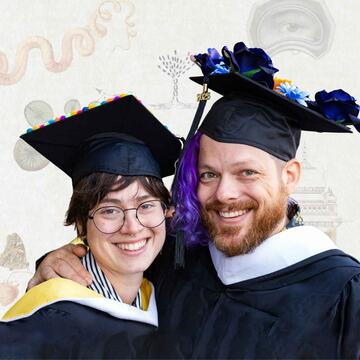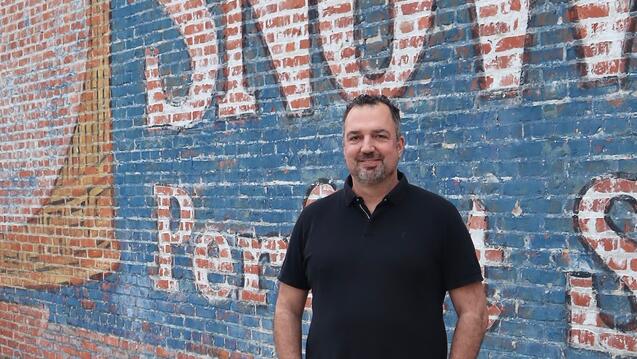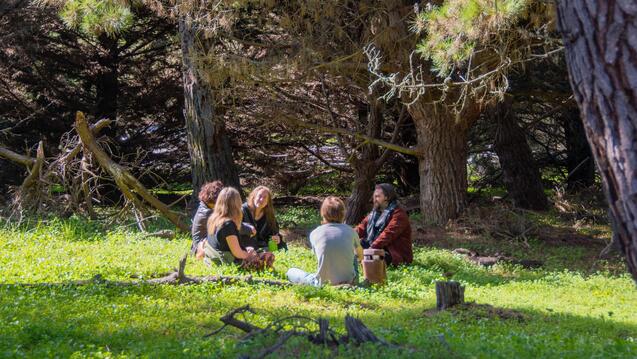Playwright and activist Alex Burger brings his global experience into the CIIS MFA classroom, teaching art as transformation, and crisis as creative fuel.
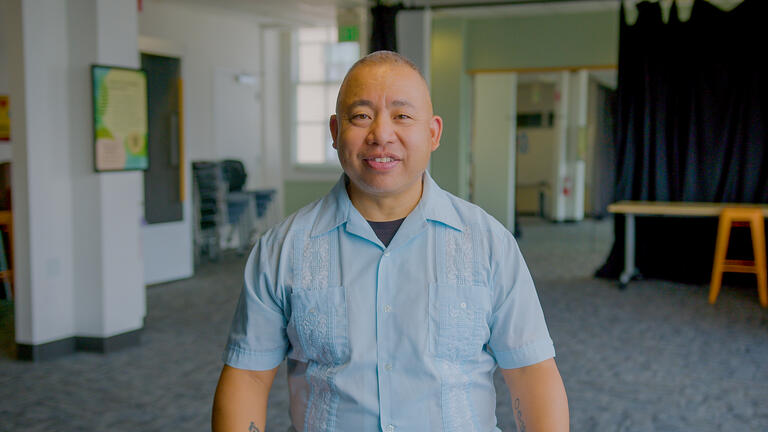
Questions from the Desert: A Veteran's Journey to Transformative Education
Fernando Ona, Chair of Transformative Inquiry at CIIS, carried questions from Iraq to the classroom—and found space to explore them.
Some questions find us in the most unlikely places. For Fernando Ona, Chair of CIIS' Department of Transformative Inquiry, the questions that would shape his life's work arose in the deserts of Iraq and Afghanistan, where he and his fellow service members grappled with profound uncertainties about war, conflict, and human response to violence. Today, as a medical anthropologist, somatic psychotherapist, and ordained minister with over 30 years of experience working with communities affected by trauma, Fernando brings those questions—and the wisdom gained from a lifetime of sitting with them—to his work at CIIS. Here in San Francisco's Tenderloin and South of Market neighborhoods, he walks alongside unhoused veterans and others experiencing violence, practicing ancient rituals of healing and transformation.
This is his story of carrying questions from the battlefield to the classroom, and of discovering that transformative education offers veterans something no traditional program can: the space to explore not just what we've experienced, but who we can become.
When I was serving in Iraq, I served with a whole group of folks who consistently asked me, Hey, Fernando, could we be doing war differently? Could we be engaging in conflict differently? Could we be rethinking how we as humans understand our responses to conflict?
At the time, I didn't have an answer to that question, nor did I have enough of the education or the capacity to attend to and address the complexities of those kinds of questions.
For many years I've been working with people who have experienced deep, profound traumas from structures of violence. What I mean by that is I'm working with communities and people who have not only witnessed conflict in personal ways, but also structures of violence, whether they come from institutions or from governments or from larger entities.
My recent work has been on sacralizing desecrated places. I'm working with a group of unhoused veterans as well as women who are experiencing violence on the streets here in San Francisco, in the neighborhoods of South of Market and the Tenderloin close to CIIS’ campus. I'm engaged in understanding desecrated places, whether it's a street corner where violence has happened, or a particular building that serves as a proxy for a person's feelings of conflict, trauma or violence in their lives. We engage in rituals to re-sacralize those spaces, so that participants’ relationships with a location or an idea are transformed.
How do we sit with suffering differently? Each time there's a commitment to sit with it differently, to engage with it differently, to seek to transform it.
Fernando Ona, Chair and Core Faculty in the Department of Transformative Inquiry
One way this manifests is connected to my own tradition and my own lineage called circumambulation or kora, where my people walk around sacred objects, whether it's a mountain or a monastery or particular groupings of stones or trees. I've worked with communities, especially communities who've experienced violence, to rethink what it means to walk around a desecrated place, to mindfully engage with that space together, to hold what prayers, mantras, sayings, ideas, thoughts that run through as we walk through in and around these places.
Many of the veterans I work with often talk about how just walking around a place where they've witnessed violence has helped them relate to that place differently. It helps them mindfully engage with what that space means to them in their lives and to imbue it with their own sense of what is sacred, to imagine what it means to reclaim a sacred place, especially one that's been desecrated.
I walked around a building where one of the women we work with was violently attacked. A group of us walked with her at the time where this event happened, and we walked around this space for about 50 or 60 times just walking mindfully, saying prayers together, a merry band of 12, 13 folks. At the end of that walk, she shared with us how important it was for her not only to engage with that space differently, but to feel that she was connected to a sacralization of that place where she experienced violence.
It didn't take the violence away. It didn't erase that memory. It just helped her sit differently with that space. She's since shared that she continues to walk around that building once or twice a week as part of her practice of connecting with that pain, of engaging with that suffering.
This has been part of the foundation of my research. How do we sit with suffering differently? How do we engage with that suffering to not only just make meaning about it, but to consistently be in process with it, engage with how we work with the pain? Sometimes the triggers come back, but each time there's a commitment to sit with it differently, to engage with it differently, to seek to transform it.
A Different Kind of Education for Veterans
As veterans, we have a lot of different educational opportunities that are afforded to us, and what I love about CIIS that is different from how I used my educational benefits as a veteran is that it has allowed folks to think differently about questions like that. The commitment at CIIS is not just to get you somewhere with education. It's about leaning into that transformative process that education and getting education does to you as a human being.
It opens you up, leans into your curiosity, makes you question and wrestle with what you're so used to and supports your critical thinking and engagement with the world so you can address certain things that you've witnessed and experienced.
We have a veteran in the transformative leadership program right now who has been thinking about how to engage in a social service agency that supports veterans, especially around their mental health. What I appreciate about the transformative leadership curriculum is that it's allowed him to rethink his leadership model for this startup that he's creating. It's giving him the tools to rethink the framework around that model. It's helped him to build out his business model for the social service agency, and it's engaged him in resources and resource management, so that leads to deepening the mission and vision to support fellow veterans in attending to and addressing their socio-behavioral needs.
Another veteran in our Transformative Studies program is deeply interested in how we address reentry into civilian life. What I've appreciated is that he's wrestling with how not only one agency or even a series of agencies work together, but how we integrate agency-wide work to address the needs of veterans and how he as a transformative agent in that space can be that unifying force.
You're not here just to learn, but to transform, to rethink how we do things, not for efficiency, but so we all can flourish in this world.
Fernando Ona, Chair and Core Faculty in the Department of Transformative Inquiry
What CIIS does for veterans, for me at least, is welcoming that kind of reality as an educational experience—that you're not here just to get a master's degree or a Ph.D. or to complete your bachelor's degree, that you're here not just to learn, but to transform, to rethink how we do things, not for efficiency, but so we all can flourish in this world, that we all can connect and engage with each other as humans and the beyond human realm.
For veterans, that's a breath of fresh air, especially if you know war, understand what it means to serve our country and to attend to and address the needs of our nation as veterans. CIIS takes seriously not only that work, but the transformative work of how we can imagine different futures together.
About Fernando Ona
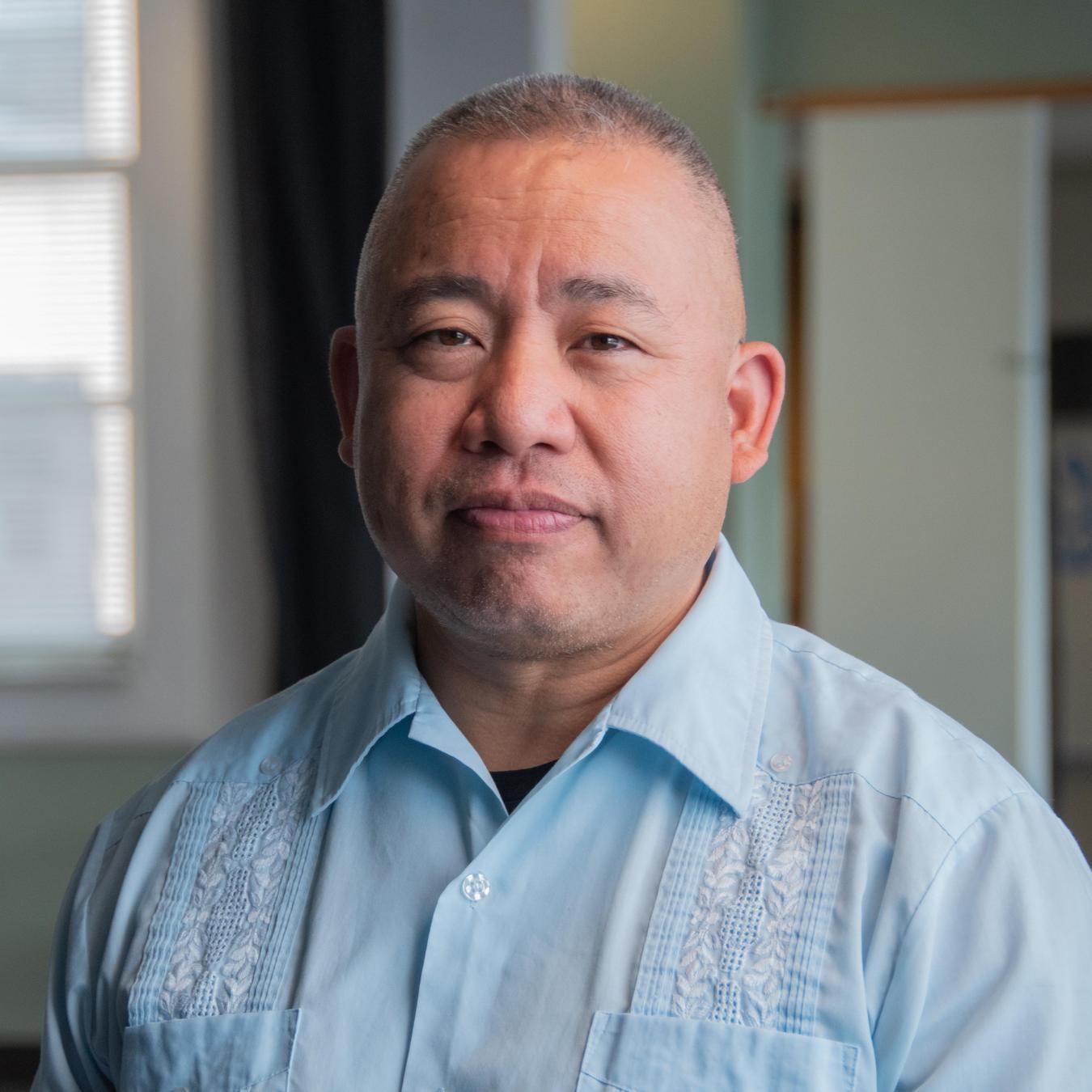
Fernando Ona is the Chair and Core Faculty in the Department of Transformative Inquiry at the California Institute of Integral Studies. A veteran of Operations Enduring Freedom and Iraqi Freedom, he has spent over 30 years working with communities experiencing trauma and violence. His research focuses on sacralization practices and transformative approaches to healing.

Transformative Inquiry
Self-inquiry, and personal growth combined with rigorous academic inquiry and action in the world
Related News
Discover the latest works from CIIS faculty—spanning psychology, spirituality, ecology and the arts. These recent publications show how our community is advancing scholarship and creativity in service of personal and collective transformation.
Chris Heuer reflects on his conversation with CIIS’ Bruce Alderman about the Blue Sky Leaders program, exploring how slowing down may be the key to thriving in the age of AI.
